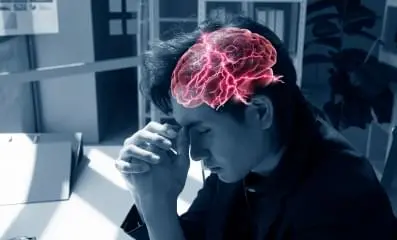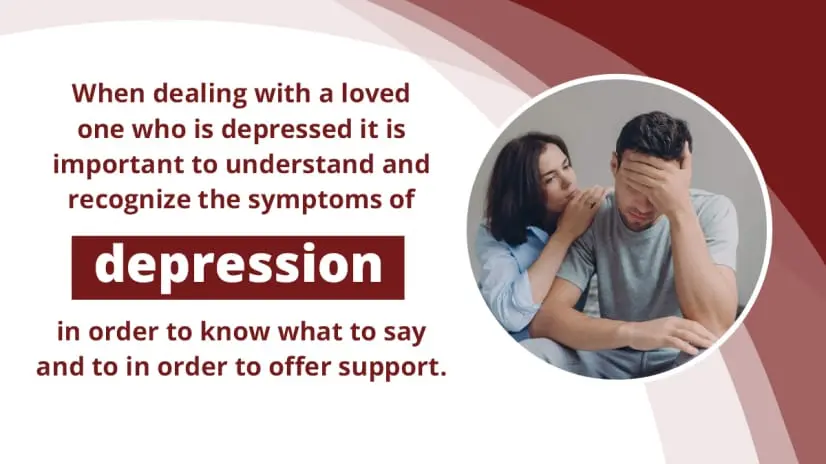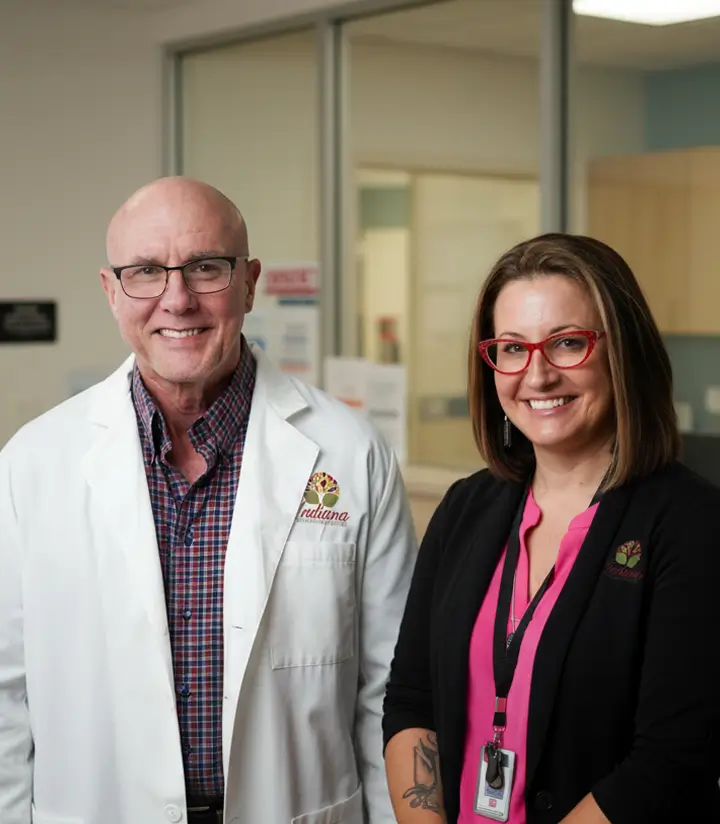
Top 10 Ways To Help Someone With Depression
Clinically Reviewed by:
Helping someone struggling with depression can be difficult. If someone you care for has depression, you may feel helpless and want to help but don’t know how. It is important to learn how you can support them and understand what they are dealing with to find the resources that can help them manage their depression.
The more you learn about depression and the different ways it can affect people, the better knowledge you will have of the right type of care they need to get better. Here is what you should know and what you can do to help.

Key Takeaways
Helping a loved one through depression can be difficult, but with your help, they can get the care they need. Here’s what you need to know:
- Depression not only affects mental health but can also affect daily activities and relationships responsibilities due to lack of interest and energy.
- Depression is treatable from a combination of medication and therapies.
- When dealing with a loved one who is depressed it is important to understand and recognize the symptoms of depression in order to know what to say and do in order to offer support.
- Be sure to be mindful of your own mental health so you are capable of offering support whenever needed.
Learn how Indiana Center for Recovery can help your loved one through their darkest days and find the light by calling (844) 650-0064.
Depression Explained
It is normal for everyone to feel sad sometimes, but the feeling usually passes. Depression, formally known as major depressive disorder or clinical depression, is much different than the occasional blues. It is capable of causing serious symptoms that affect the way people think and feel and cause people to abandon their daily activities and responsibilities. Depression is an illness that does not discriminate. Any individual, regardless of age, race, income, culture, or education, can be affected by it. According to the National Library of Medicine, studies show that genetics, biological, environmental, and psychological factors play a role in depression affecting individuals.
Depression can also be developed when other mental disorders or illnesses are made apparent. Illnesses such as diabetes, cancer, heart disease, and chronic pain can cause one to feel depressed and may worsen the condition. Additionally, certain illnesses may require medication as a course of treatment, and the side effects of these medications may inflict depression.
Types of Depression
There are two common forms of depression.
- Major depression: symptoms can last consistently for at least two weeks, interfering with one’s ability to work, sleep, study, and eat.
- Persistent Depressive Disorder: symptoms tend to be less severe but last much longer. These symptoms can last for years at a time.
Here are some other forms of depression.
- Perinatal depression: this type of depression is commonly referred to as postpartum depression, which may develop during pregnancy or after birth.
- Seasonal Affective Disorder: This type of depression revolves around late fall and winter due to the lack of sunlight and is typically gone by spring and summer.
- Depression with Symptoms of Psychosis: This is a severe type of depression where individuals experience psychosis symptoms such as delusions and hallucinations.
In addition, those diagnosed with bipolar disorder, commonly referred to as manic depression, tend to experience depression regularly.
Identifying Symptoms of Depression
For many individuals, depression symptoms can affect their daily activities and responsibilities, such as work, school, social outings, and relationships. Many people with depression usually feel sad without knowing what may be causing them to feel that way. Here are some symptoms that can be a telling factor if someone may be battling depression:
- Feeling sad or crying
- Expressing they feel empty, numb, and hopeless
- Showing outbursts of anger, irritability, or frustration even over small inconveniences
- Constantly anxious, restless, or nervousness
- Oversleeping or barely sleeping
- Expressing they are always tired or lack energy, even for the smallest of tasks
- Loss of appetite and weight loss or increased appetite and weight gain
- Physical body aches and pains with no medical proof of a problem. Examples include back pain or headaches.
- Slowed thinking, speaking, or body movements
- Trouble thinking, concentrating, remembering, and making decisions
- Expressing feelings of worthlessness, guilt, and shame
- Frequent and repeated mention of not wanting to live, suicidal thoughts, or suicide attempts
It is important to note that depression symptoms tend to vary from person to person.
10 Ways To Help Someone With Depression
It is heartbreaking to see someone we care for suffer with their mental health. We are willing to do everything we can to help them get better, but we just don’t know what to do or say sometimes.
Jackie Daniels, Director of Clinical Development at Indiana Center for Recovery, gives ten pointers on how to help someone.
Educate Yourself About Depression
You can provide better help if you learn more about depression symptoms and how it’s affecting your loved one’s mental health. According to Daniels, common symptoms include a persistent feeling of hopelessness or sadness, loss of interest or pleasure, lack of energy, and a disturbance in sleeping and eating habits. She also stresses the importance of understanding that there are several forms of depression, and the way people experience it varies.
Listen Without Judgment
When someone is suffering from depression, judgment or criticism can cause more damage. If your loved one is willing to open up about their struggles with you, it is important to listen without passing judgment. Daniels emphasizes the importance of understanding that depression is a chronic illness where one should not be blamed for being sick. Depression has no boundaries. It can affect anyone.
She expresses how questions are okay to be asked as long as they do not come off in a judgmental or belittling way.
For example, it is acceptable to ask, “What do you think made you feel this way?” versus “You have such a great life; why do you feel this way?”
Offer Hope
Those struggling with depression normally feel hopeless. You can offer hope to your loved one by reminding them of the things worth living.
According to Daniels, she states the importance of avoiding toxic positivity phrases such as “Just be thankful for everything you have” or “Don’t worry, everything will be okay.” Instead, she suggests asking them about what makes their lives valuable. This may include asking about their hobbies or a pet you know they love.
Offer Help With Everyday Tasks
Depression not only affects a person’s emotions but also their daily tasks. Due to the lack of interest or energy for daily responsibilities, individuals who are depressed often struggle with everyday chores and tasks.
Daniels states how important it is to be helpful and provide practical help to a loved one as needed. Ask how you can help them. This can include weekly grocery shopping, helping with cleaning or laundry, or even cooking a meal or two.
She explains how going the extra mile and doing small gestures like surprising them with flowers, buying them their favorite magazines, calling them to tell them how much you love them, or just being with them can be really helpful.
Keep Reaching Out
People who suffer from depression often isolate themselves. You may be pushed away when trying to show love and support. Daniels states the importance of consistently reaching out without taking rejections personally if they decline your offer. Even if your loved one lacks the energy to participate in your request, they need to know that you care and that can make a difference. Regularly reaching out makes spending time with family and friends easy for them to accept when they are ready.
Encourage Professional Help
It is important to encourage medical help. According to Daniels, depression is a treatable condition with a combination of medications and therapy. Be sure to emphasize the benefits of receiving treatment and offer help making appointments if needed.
“It is especially important for someone suffering from depression to get treatment if their depression has progressed to the point of suicidal ideation,” said Daniels.
Be Prepared to Act in Emergency Situations
“If you have any concerns that your loved one will harm themselves, you must intervene and take action. If you believe your loved one is about to commit suicide, contact emergency services,” said Daniels.
This can be a difficult decision to make, especially if they insist that no help is needed. They may be mad at you for interfering, but because of your quick intervention, you will have a helping hand in keeping them safe.
Be Patient
Even though it can be frustrating when trying to help someone who is depressed, remain patient. Daniels expressed the importance of making sure that the depressed are not abandoned, especially since this is when they need help from you the most.
Celebrate Their Successes
Recognizing and crediting any achievements and progress can be difficult when going through difficult times. Daniels suggests congratulating a loved one and doing something pleasant together. Doing so helps them take a step forward by confronting the problem and improving their well-being.
Take Care of Yourself
When helping someone with depression, don’t get hung up in the process. It is difficult to navigate a relationship when the other person is depressed, whether it is a family member, a close friend, or a spouse.
“If you want to help others, you must first take care of yourself. This is especially important to remember if you suffer from depressive symptoms,” said Daniels.
Trying to figure out how to help someone who is depressed can be tiring and overwhelming. Be sure to help yourself and take the time to get the help you need.
How to Encourage Someone to Get Help for Depression
There are times when someone with depression doesn’t know or won’t admit they are depressed. This is because they may be unaware of the symptoms associated with depression, leading them to believe that their feelings are normal.
Other times, people feel ashamed about being depressed and believe that they can overcome it on their own. However, depression rarely gets better without treatment. With the right care, they can get better.
Here are some ways you can help encourage treatment:
- Tell them what you have seen and why you are worried about their happiness.
- Explain that depression is a mental health condition and not a personal weakness or flaw and how seeking help can help them heal.
- Suggest seeking help from a mental health care provider. A provider, such as a therapist, psychologist, or psychiatrist, can correctly diagnose and treat the condition to make wellness possible.
- Express your willingness to help them in any way possible.
If depression is severe or potentially life-threatening for an individual, then you must contact a healthcare provider, mental health care provider, or emergency medical services.
Frequently Asked Questions (FAQ)
How can I help someone with depression?
To help someone with depression, be sure to educate yourself on depression to understand what they are going through. If they want to talk about their emotions, remain welcoming and listen. It is important not to belittle their feelings and be understanding. Offer help in finding a doctor and even scheduling an appointment if necessary. Make sure to celebrate their successes as they heal.
How to help someone with depression who won’t talk?
Respect their decision to not talk about the problem. Instead, express an understanding of how difficult it is to talk about mental health. Let them know that you’re available to talk when they are ready. Recognize that they may never be ready or want to talk to you about their mental health, and try your best not to take it personally and find other useful ways to help or spend time with them. The most important thing to do is offer support in any way you can.
Get Help for Depression Treatment
Depression is a treatable mental health condition that affects how people think, feel, and function in their daily lives. If someone you care about is struggling with depression, encouraging them to seek professional help is one of the most important ways you can support them. At Indiana Center for Recovery, we understand the importance of mental well-being and provide comprehensive depression treatment through proper diagnosis and evidence-based care designed to help individuals achieve healing and recovery.
Treatment for depression typically includes a combination of medication and therapy, with our comprehensive mental health treatment programs offering both intensive residential treatment and flexible outpatient treatment options. Our evidence-based approaches include Cognitive Behavioral Therapy and medication management to address depression symptoms and help individuals regain their quality of life. Many individuals with depression also struggle with substance use, as they may turn to drugs or alcohol to self-medicate, which is why our integrated dual diagnosis treatment addresses both depression and co-occurring substance use disorders simultaneously, using addiction treatment approaches combined with mental health care to support comprehensive recovery.
Recovery from depression is possible with professional help and ongoing support. We offer treatment centers across Indiana where you or your loved one can access specialized depression treatment programs designed to help individuals overcome depression and improve their mental well-being. Our compassionate team provides proper diagnosis and correct treatment tailored to each individual’s needs. Call us today at (844) 650-0064 to learn more about our depression treatment services and take the first step toward healing.






 100% Confidential
100% Confidential
